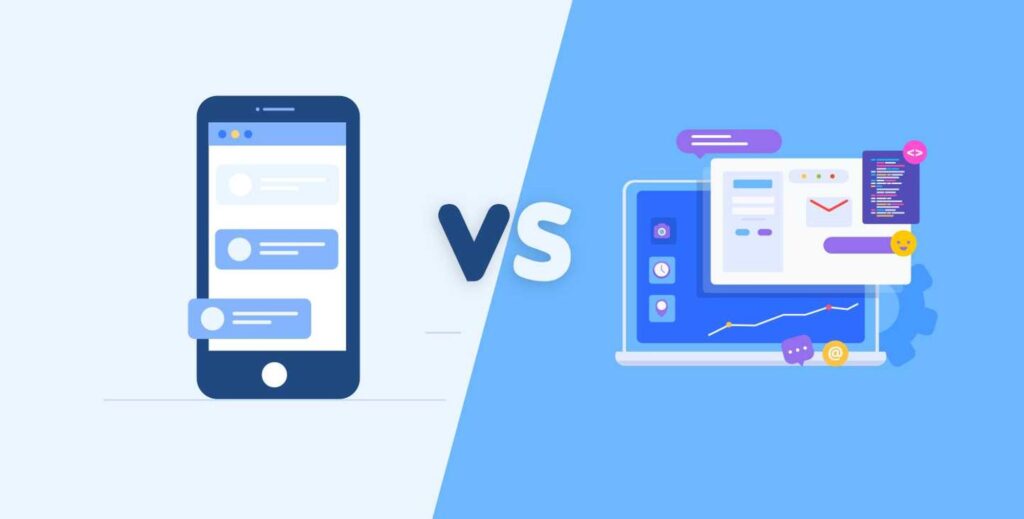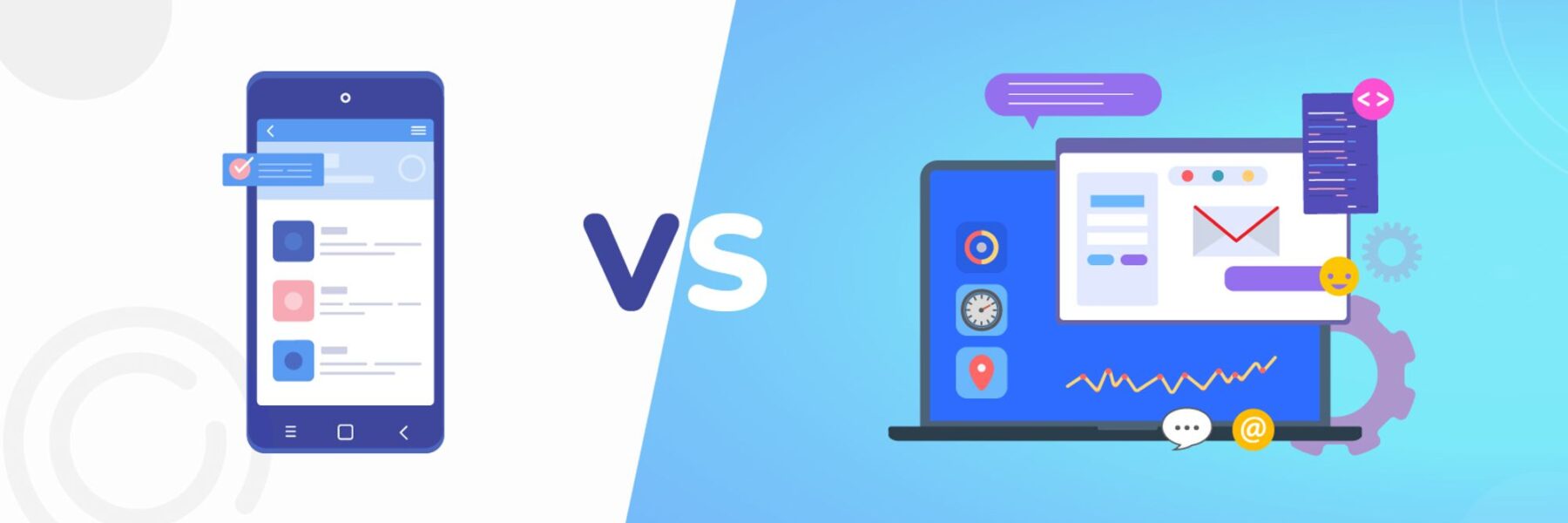Embark on an enlightening exploration of the fascinating domains of mobile app and web development. In today’s interconnected world, comprehending the distinctions between these two pillars of technology is paramount. Brace yourself for an immersive journey where we dissect the intricacies, unravel the complexities, and unveil the distinguishing features that shape the landscape of mobile app and web application development.
What are Mobile and Web App Development?
It is predicted that 258 billion mobile apps will have been downloaded globally by 2023. That’s a staggering number that underlines the immense impact of apps on our daily lives. We live in an age where apps rule, and understanding the world of mobile and web app development is crucial.
Mobile app development focuses on crafting software applications designed for mobile devices like smartphones or tablets. Meanwhile, web app development involves creating applications stored on remote servers and delivered via the Internet.
What are the similarities?
Though mobile and web app development each have their distinct nuances, they share common ground:
- User Experience: Both types prioritize a smooth, engaging user experience.
- Development Tools: Each uses programming languages and follows a similar sequence of stages, from ideation to deployment.
- Security: Both mobile and web apps handle sensitive data, making robust security measures a must.
Yet, the specifics of the development processes do differ. Mobile apps can be native, web, or hybrid, each with unique considerations. Web apps need to account for browser compatibility and varied platforms.

In a nutshell, mobile and web apps form the backbone of the digital age. They enhance customer interaction, streamline operations, and offer unique solutions in an increasingly digitally-connected world.
Differences Between Mobile App and Web Development
At a glance, the realms of mobile app development and web development may appear similar. However, they require different skill sets, follow distinct protocols, and ultimately serve varied user experiences. Let’s delve into the distinctive characteristics of both.
Languages and Tools
In the world of web development, the trinity of HTML, CSS, and JavaScript reigns supreme. These are the core languages for creating interactive, responsive, and visually appealing websites. Developers can utilize frameworks such as Angular.js, Vue.js, or React.js to streamline their work. For the backend, they might employ Python, Java, Ruby, or Node.js, with a multitude of databases to choose from.
In contrast, mobile app development languages vary depending on the operating system. For instance, Swift and Objective-C are used for iOS, whereas Java and Kotlin dominate the Android landscape. Hybrid development frameworks like React Native, Flutter, or Xamarin allow cross-platform development using a single codebase, making them increasingly popular.

User Interaction and Experience
Web Application Development Services offer a universal experience, available across different devices and operating systems without requiring downloads or installations. However, they can sometimes be slower, more dependent on the internet connection, and less integrated with the device’s features.
Mobile apps, on the other hand, are designed for specific operating systems and provide a more seamless, immersive experience. They can leverage device-specific features like GPS, camera, or accelerometer, thus enriching the user experience. Nevertheless, mobile apps necessitate regular updates to ensure compatibility with evolving operating system versions.
Development and Maintenance
Web development follows a more unified process since websites are generally platform-agnostic. Changes and updates can be deployed easily and become instantly available to all users. This homogeneity significantly eases maintenance efforts and costs.
Conversely, mobile apps must be tailored to each platform’s standards (iOS, Android), thereby necessitating more resources and time. Once an app is deployed, it’s the user’s responsibility to update it, which can lead to fragmentation if not all users update promptly.
Accessibility and Distribution
Web applications are readily accessible via a web browser and URL, facilitating swift access and sharing. However, they might not be as discoverable as mobile apps, which have dedicated platforms like Google Play Store or Apple App Store that boost visibility.
Mobile apps can offer offline access, a key advantage in areas with spotty internet coverage. However, getting an app approved and published on app stores can be a complex, often stringent process.

Comparing Mobile and Web App Development
| Aspect | Mobile App Development | Web Development |
| Languages | Multiple languages required for different platforms (Swift, Java, Kotlin) | Universal languages used (HTML, CSS, JavaScript) |
| User Experience | Rich, immersive, and device-specific | Universal across devices, no installations needed |
| Offline Access | Available, but requires device storage | Limited, mostly internet-dependent |
| Distribution | High discoverability on app stores, though the publishing process can be complex | Easily accessible via URLs, but potentially less discoverable |
| Maintenance | Can require more resources due to platform-specific needs, potential for fragmentation | Simplified process with instant updates, leading to lower maintenance effort |
This table provides a condensed overview of the strengths and challenges inherent in both mobile app and web development. Keep in mind that the landscape of software development is continually evolving, and the right choice is contingent on the specific needs and goals of your project.
Choosing Between Mobile and Web App Development?
The choice between mobile app development and web development is a pivotal decision shaping your digital journey. In this conundrum, it’s crucial to allow your project’s requirements, resources, and audience expectations to be the guide.
Does your project demand seamless integration with device functionalities and an immersive user experience? Or is offline accessibility a paramount consideration? If so, you may lean towards mobile app development. Remember, though, this approach might require a more significant investment of time and resources, owing to the need for platform-specific coding.
Conversely, if your goal is to reach a wide audience across different devices without hefty downloads, web development could be your ideal choice. Keep in mind that web applications might lack speed and comprehensive offline functionality compared to their mobile app counterparts. Also, explore hybrid solutions like PWAs or cross-platform mobile frameworks to bridge the divide. Your project’s unique requirements should steer this critical decision.

Conclusion
In conclusion, the choice between mobile and web app development hinges on a multitude of factors ranging from user experience to maintenance requirements. By comparing and understanding the different aspects of both approaches, you can make an informed decision that aligns with your project’s unique needs. Whether it’s the immersive interface of mobile apps or the universal appeal of web development, your chosen path will pave the way for a robust digital presence. Navigating the Mobile App vs Web Development decision effectively is a crucial stride on your journey toward digital success.
